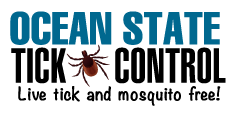Let’s make it safe for you and your families to enjoy your outside spaces again!
Ocean State Tick Control
Our Tick Control Program
Below are some common questions we receive about our tick control practices, materials and cost. Please click on the question to reveal the answer and if we don’t address a question you have about Ocean State Tick Control, please contact us.
Why should we treat your yard?
Deer ticks and the diseases associated with them have become one of this area’s top health threats. As you may well know, tick borne diseases are difficult to prevent because the deer ticks that carry the disease are so small (the size of a poppy seed), which makes it nearly impossible to find the ticks on ourselves, our children and our pets.
How do we treat your property?
We walk through your yard doing a thorough inspection for tick host sites needing treatment. These are typically stone walls, planting and mulch beds, wood piles, brushy areas, and perimeter of lawns. Field mice, squirrels, chipmunks, rabbits, and deer are all carriers of ticks and live in these areas.
When should your property be treated?
We recommend four treatments per year, every 6-8 weeks; beginning in March and ending in October. Together, this thorough treatment program targets all stages of the the tick’s life and significantly reduces the overall tick population. While it is important to treat at each stage of the tick’s life cycle, it is never too late to begin.
Application #1 in March/April
This first treatment done as soon as the snow is gone. This treatment is extremely important, because it allows us to kill the adult ticks, coming out of winter dormancy, before they have a chance to reproduce. Thus, there are no eggs laid in the treated areas.
Application #2 in May/Late Spring
This treatment targets the emerging nymph deer ticks. These are the adolescent (poppy seed sized) ticks which are very hard to detect. They are present from late May until July. The nymphs require two blood meals in order to develop into adult ticks. They acquire those meals from prey such as: humans, pets, deer, chipmunks and mice. By eliminating them, there are no nymphs present for metamorphosis into adults in the future.
Application #3 in Late June/July
This treatment is a second application targeting the emerging nymph deer ticks. These are the adolescent (poppy seed sized) ticks which are very hard to detect. They are present from late May until July. By eliminating them, there are no nymphs present for metamorphosis into adults in the future.
Application #4 in Fall
This treatment targets the resurgence of the adult ticks. By eliminating adults, there are no eggs laid in the treated areas. This helps prevent an outbreak of a tick population come the following Spring.
What do we use?
We use PERMETHRIN, a product, which has been specifically formulated for use in residential settings. This is the #1 treatment recommended by the URI Tick Awareness Center (URI’s TickEncounter Resource Center). While this is NOT TOXIC to humans, pets, and birds, it is TOXIC to ticks, fleas, mosquitoes, ants, and spiders. After one hour drying time, it is completely safe for walking and playing. For once it dries, the PERMETHRIN sticks to the grass and brush and does not rub off on passers by. It also resists getting washed off by rain for several weeks. Another attribute to PERMETHRIN is that it adheres to the top 4cm of soil/surface and is biodegraded by sunlight and soil organisms. This means that after a few weeks, there is absolutely no residue from a spray, as opposed to other materials which slowly toxify your property. Because our product does not permeate the soil layer, it Does Not Affect your well water. Once again, it is deadly for ticks, spiders, ants, and mosquitoes, but safe for us.
What does it cost?
The price is based upon the amount of area treated in your yard. Just because you may have a large property, it does not mean that it all has to be sprayed. When you meet with one of our professionals, we will look at what parts of your yard are used by your family and pets, and then come up with a treatment program. After we define the parts of your property which are used, we will outline a treatment program based on that. We currently have some customers whose applications are as little as $95 per treatment.
Service Areas
Please see the service areas page to learn which towns Ocean State Tick and Mosquito Control Program services in Rhode Island.
